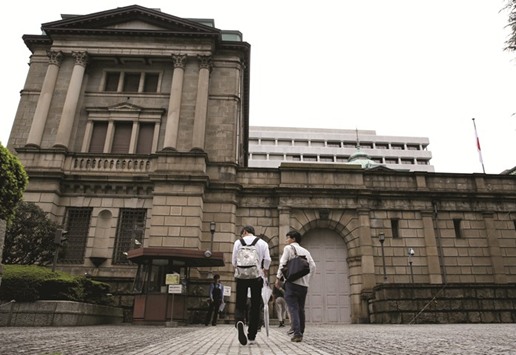The Bank of Japan (BoJ) will reduce its purchases of shorter-maturity government bonds further in May as supply of the securities continues to be scarce.
The central bank will buy less of notes due in three-to-five years this month, it said in a statement on Friday.
It kept the estimated buying amount for the remaining categories, as well as frequencies of operations, unchanged. Based on the midpoints of the authority’s purchase range for different bond maturities, the BoJ is seen buying ¥7.8tn ($70.1bn), compared with a similarly-arrived estimate of ¥8.1tn for April. The central bank actually bought ¥8.32tn last month.
The BoJ is slowing purchases after having accumulated about 40% of the nation’s outstanding government debt, as investors assess its commitment to controlling the yield curve and the sustainability of the massive bond-buying programme.
The central bank on Thursday kept its stimulus policies unchanged while lowering its inflation forecast, underscoring that any exit from its unprecedented monetary easing remains far away.
Shorter-maturity bonds continue to see robust demand from foreign investors, who do not lend in repurchase agreements as local investors do, causing tightness in supply, said Takenobu Nakashima, quantitative strategist at Nomura Securities Co in Tokyo.
“To change this structural problem for the five-year sector, the share of Japanese investors must rise, and for that to happen, the five-year yield must emerge from negative to zero,” Nakashima added.
The central bank has bought ¥35.4tn of bonds through its market operations between January and April. At this pace, purchases for the 2017 fiscal year that began April 1 will likely be less than ¥70tn, after taking into account around 40tn yen of notes that are due for redemption in the period.
Unlike April, the BoJ in March ended up buying less than the amount indicated by the midpoints of its purchase ranges. Governor Haruhiko Kuroda said on Thursday that the actual buying amount will fluctuate depending on market conditions, and that he saw no problems from such fluctuations.
Earlier in April, the five-year yield fell to -0.175%, the lowest since November, while the two-year yield fell to as low as -0.235% during the month. The 10-year yield briefly touched zero% for the first time since November and was at 0.015% on Friday.
Details of the BoJ’s May plan announced include: Buying debt of 1-to-3 year and 3-to-5 year maturity on May 1, 10, 17, 22, 24, 31; to spend about ¥200bn to ¥300bn at each operation for the 1-to-3 year maturity; to spend about ¥250bn to ¥350bn at the 3-to-5 year operation; buying debt in the 5-to-10 year maturity on May 1, 10, 12, 17, 24, 26; to spend about ¥350bn to ¥550bn per operation; buying debt of more than 10 years on May 8, 12, 19, 26, 31; to spend about ¥150bn to ¥250bn for each 10-25 year operation, and about ¥50bn to ¥150bn for bonds with more than 25 years maturity.
BoJ also lowered its projection for the amount outstanding of Treasury bills to be bought at the end of May to ¥29tn to ¥31tn, from its forecast of about ¥30tn to ¥32tn for the end of April.

Men walk towards the Bank of Japan building in Tokyo. The BoJ will reduce its purchases of shorter-maturity government bonds further in May as supply of the securities continues to be scarce.
